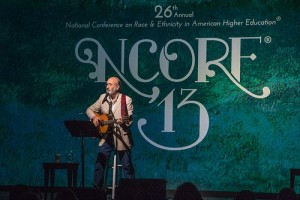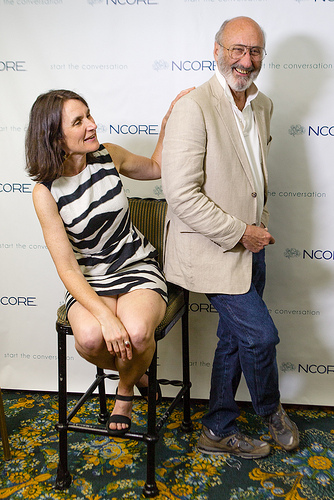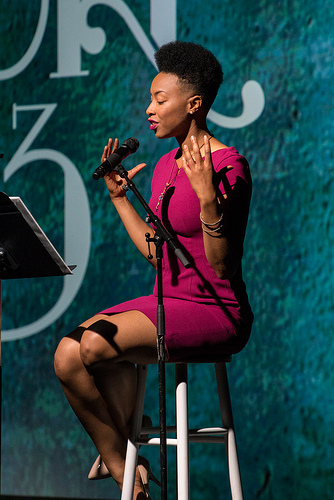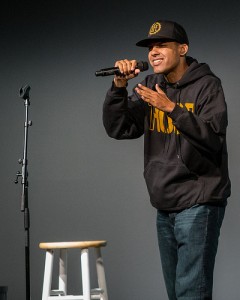“It doesn’t matter what you play, it’s what you say.” Sounds a bit cliché and perhaps hippie-dippy, but some things are cliché for a reason, especially when these are words spoken with conviction by one of folk music’s most celebrated and successful artists. When Noel Paul Stookey (the “Paul” of Peter, Paul and Mary) makes this statement to a ballroom full of education activists and music fans, it suddenly holds everyone in the room, artist or fan, accountable for the content of their music.

Paul Stookey (of Peter, Paul and Mary) at NCORE's Music Matters event in New Orleans. | Photo: Willow Haley
Stookey reinforced this mantra last week by inviting two renowned contemporary artists to the Music Matters stage to perform with him at the 26th annual National Conference on Race and Ethnicity (NCORE) last week in New Orleans. These musicians are involved in music genres not necessarily as popularly linked to social movements as Peter, Paul and Mary’s music of the 1960s; instead Carolyn Malachi and Jasiri X are more well-known in the urban R&B and hip-hop communities. Together, folk, hip hop, jazz, R&B, soul, alt-rock, and spoken word weaved a most entertaining musical journey on which both pop hits and underground classics alike were cleverly juxtaposed to prove that any music genre “matters,” so long as the message is powerful.
NCORE and Stookey’s legacy initiative, Music2Life, collaborated to present the Music Matters series in an effort to inspire content-driven music in today’s climate of product-driven popular music. Stookey and Music2Life Executive Director, daughter Elizabeth “Liz” Stookey-Sunde, are adamant about the artists they select to represent the program, stating in an interview with OffBeat Magazine that “our artists have to actually walk the walk, not just talk the talk.”
Liz explained how she, her father and their team carefully choose the performers they invite to perform at Music Matters. She noted that their music must be clearly about positive social change, but these artists also have to have a visible track record of leading by example and living the life they preach through their music. Paul joked that some of these artists are giving him a run for his money, that soon they may have to “hang him up in the closet with the mothballs,” given the style and innovation of the younger, more contemporary artists with whom they’re working.
However, Liz disagrees, and stressed that while some may find much of the folk music of the 60s era a bit too passive to be effective, the core values are the same and that actually, Music Matters is the perfect opportunity to catapult rising or underground artists in genres such as hip hop or urban alternative onto the national and international scene. “But they have to be good,” added Liz. “Encouraging sing-alongs around the camp fire are great, and there is a place for that, but we need committed artists that have the ability to reach vast numbers of people with solid talent; that is the other criteria.”
The talent and community activism of May 31st’s Music Matters guests were certainly not in question. Each creatively explored the three Music Matters “proclamations” through personal musical influences as well as original music of their own. Jasiri X, a Pittsburgh-based hip hop artist, talk show host, and co-founder of One Hood, stirred energy with his song, “Do We Need to Start a Riot?” He demonstrated the first Music Matters proclamation that “music challenges” with the introduction of his original song about racism-fueled violence and a desperate need to stop street violence caused by unequal opportunity, among other music selections that challenge people to act constructively.
Stookey himself linked Jasiri’s performance with that of the Grammy-nominated urban alternative artist and education activist, Carolyn Malachi, through the second Music Matters proclamation that “music changes.” He presented a sampling of music that addressed social change issues such as racial tension and political oppression, including a recently-penned tune. Music curated from Billie Holiday to Jimi Hendrix and Rage Against the Machine to Public Enemy painted a clear picture of how we are more alike than we are different, even when it comes to musical taste. Finally, the Washington, DC-based Malachi made believers out of her audience with her multi-octave range, all in the name of creating dialog between people. “Music educates,” she declared. “We’ve got to spread the word.”
Recalling the famous 1971 “peace and love” Coca-Cola commercial that opened the show, host and Music2Life founder, Paul Stookey reminded the audience that while music is great in and of itself, it is also a vehicle for change. After all, if one song can influence millions of people to buy Coca-Cola over all other sodas in 1971, then certainly we can use music to inspire other more meaningful actions. The evening of live music, accompanied by benchmark moments of conscious music history projected on multi-media screens, engaged guests in several ways, including dance, call-and-response, and even in the use of mobile phones when Stookey, Jasiri and Malachi asked everyone to film each other on their phones and post the live music-making to social media on the spot.
Unfortunately, the New Orleans artist scheduled to perform, poet and spoken word vocalist Chuck Perkins, was not able to make the show, but Liz encouraged any socially-conscious, dedicated New Orleans musicians to reach out and contact Music2Life, as they are always looking for talented local artists to collaborate with on their future events and music compilations. In fact, she expressed a wish that the organization had been more connected to the New Orleans music community prior to organizing the NCORE 2013 edition of Music Matters; she’s looking forward to working with more New Orleans artists now that they’ve “gotten their feet wet” in the Big Easy.

Paul Stookey and daughter Liz Stookey-Sunde, Executive Director of Music2Life at NCORE 2013 in New Orleans. | Photo: Willow Haley
Paul said that the catalyst that spurred him to create Music2Life was the need for a central resource where one can find various musicians writing about a given cause, a single portal where the cause is the filter, no mtter what the genre of music. Though the organization is still relatively new and constantly evolving, much like music itself, the group’s main quest for now is to generate answers to the question, “How do we expose music of meaning?” Meeting more artists that create music in this vein through the Music Matters series, then, accomplishes this goal.
The Music2Life mission states that it is “soundtrack for social change.” Its flagship program, Music Matters, was created to inform, inspire, and ignite action through musical collaboration. Jasiri X sees his role as a collaborator, and is also about engaging new media. This is his fourth time performing with Music2Life, and as the co-founder of One Hood, a program to help young African-American men to become media-literate and to assist them in creating their own media investments, he observed that the current representation of social justice music brings the hip hop legacy of revolution and rebellious energy to young learners. “Conscious music” also provides educational appreciation for other genres, Jasiri noted from his experience. As this is only his second visit to New Orleans, he observed how New Orleans heavily supports its artists – a practice many other cities could learn from. He said that this is instrumental in healthy cultural identities and naturally preserves the music itself.

Grammy-nominated urban alternative artist, Carolyn Malachi at NCORE 2013's Music Matters event. | Photo: Willow Haley
Malachi continued to praise New Orleans when she crooned, “New Orleans has a charming energy, it’s warm and bubbling, but also magical and mysterious.” Malachi said that she has been influenced by New Orleans musicians—Harry Connick Jr., Dr. John and Trombone Shorty—and would love to collaborate with any or all of them. Malachi often uses her role as a performing artist with Music2Life for philanthropic purposes for education. For example, Malachi used the “I AM” campaign in collaboration with the online release of her recent recording project to raise money to fund education. The online sale of each song provided one hour of class time for those in need. She plans to conduct a similar campaign with the release of her new album, Gold, due out this July.
Successfully exposing “music of meaning” to a wider audience is already a mainstay of Music2Life’s programming, but Paul and Liz hope to explore ways to get meaningful music into the eyes and ears of those without access to advanced technology as well. But that’s for a whole other initiative. In the meantime, Music2Life encouraged local artists to “bridge the generational, gender and ethnic gaps to create the next soundtrack for social change.
More information about NCORE and the Music Matters event series here.
Learn more about Music2Life or contact the team to participate here.
View the full event photo gallery by OffBeat contributing photographer, Willow Haley here.





